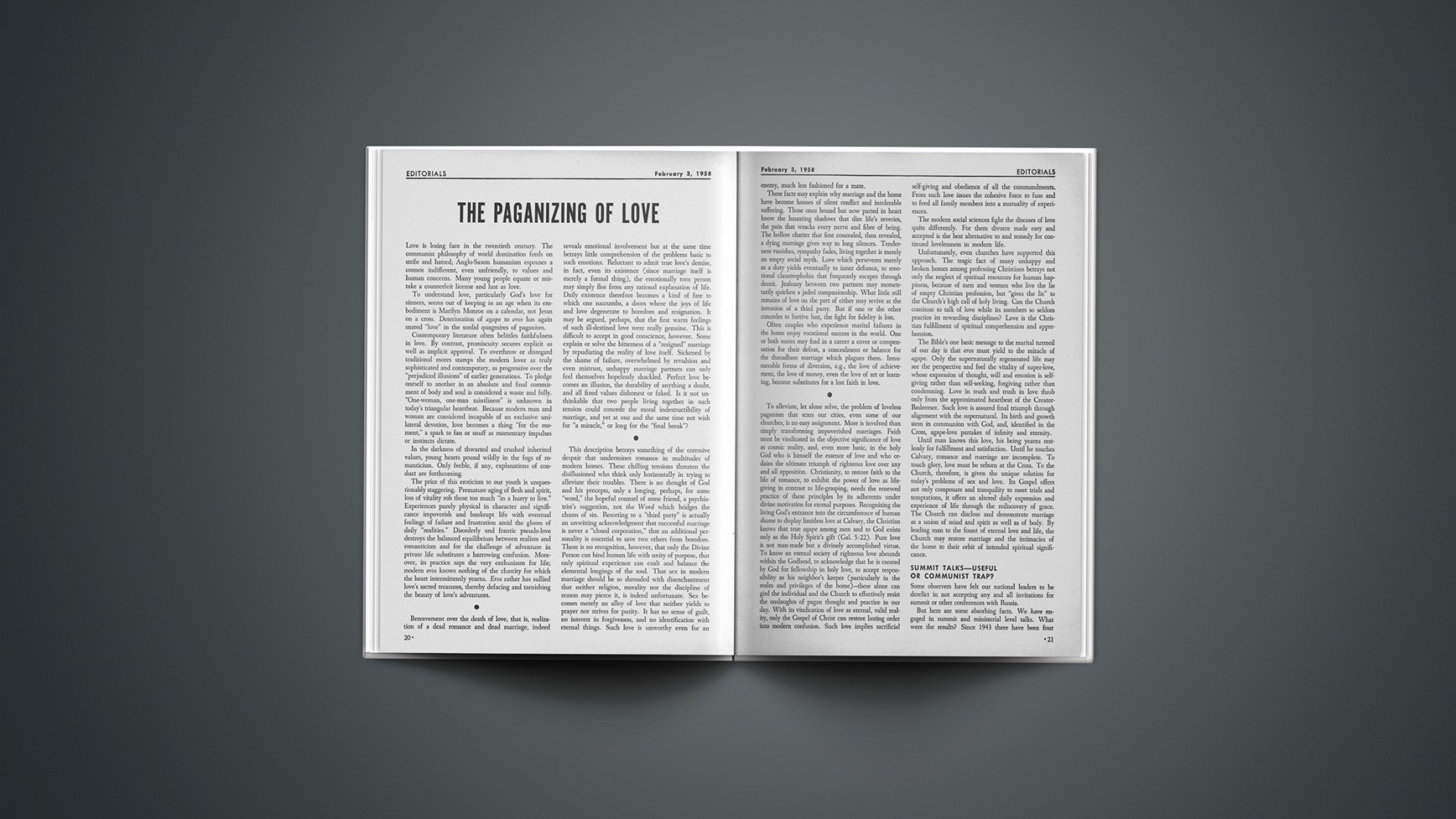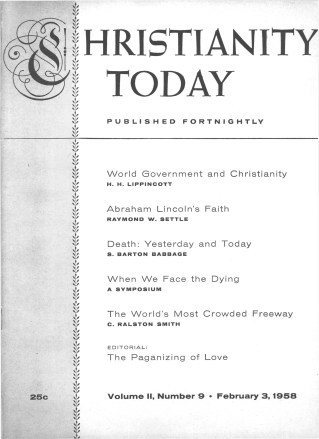Love is losing face in the twentieth century. The communist philosophy of world domination feeds on strife and hatred; Anglo-Saxon humanism espouses a cosmos indifferent, even unfriendly, to values and human concerns. Many young people equate or mistake a counterfeit license and lust as love.
To understand love, particularly God’s love for sinners, seems out of keeping in an age when its embodiment is Marilyn Monroe on a calendar, not Jesus on a cross. Deterioration of agape to eros has again snared “love” in the sordid quagmires of paganism.
Contemporary literature often belittles faithfulness in love. By contrast, promiscuity secures explicit as well as implicit approval. To overthrow or disregard traditional mores stamps the modern lover as truly sophisticated and contemporary, as progressive over the “prejudiced illusions” of earlier generations. To pledge oneself to another in an absolute and final commitment of body and soul is considered a waste and folly. “One-woman, one-man saintliness” is unknown in today’s triangular heartbeat. Because modern man and woman are considered incapable of an exclusive unilateral devotion, love becomes a thing “for the moment,” a spark to fan or snuff as momentary impulses or instincts dictate.
In the darkness of thwarted and crushed inherited values, young hearts pound wildly in the fogs of romanticism. Only feeble, if any, explanations of conduct are forthcoming.
The price of this eroticism to our youth is unquestionably staggering. Premature aging of flesh and spirit, loss of vitality rob those too much “in a hurry to live.” Experiences purely physical in character and significance impoverish and bankrupt life with eventual feelings of failure and frustration amid the gloom of daily “realities.” Disorderly and frantic pseudo-love destroys the balanced equilibrium between realism and romanticism and for the challenge of adventure in private life substitutes a harrowing confusion. Moreover, its practice saps the very enthusiasm for life; modern eros knows nothing of the chastity for which the heart intermittently yearns. Eros rather has sullied love’s sacred treasures, thereby defacing and tarnishing the beauty of love’s adventures.
Bereavement over the death of love, that is, realization of a dead romance and dead marriage, indeed reveals emotional involvement but at the same time betrays little comprehension of the problems basic to such emotions. Reluctant to admit true love’s demise, in fact, even its existence (since marriage itself is merely a formal thing), the emotionally torn person may simply flee from any rational explanation of life. Daily existence therefore becomes a kind of fate to which one succumbs, a doom where the joys of life and love degenerate to boredom and resignation. It may be argued, perhaps, that the first warm feelings of such ill-destined love were really genuine. This is difficult to accept in good conscience, however. Some explain or solve the bitterness of a “resigned” marriage by repudiating the reality of love itself. Sickened by the shame of failure, overwhelmed by revulsion and even mistrust, unhappy marriage partners can only feel themselves hopelessly shackled. Perfect love becomes an illusion, the durability of anything a doubt, and all fixed values dishonest or faked. Is it not unthinkable that two people living together in such tension could concede the moral indestructibility of marriage, and yet at one and the same time not wish for “a miracle,” or long for the “final break”?
This description betrays something of the corrosive despair that undermines romance in multitudes of modern homes. These chilling tensions threaten the disillusioned who think only horizontally in trying to alleviate their troubles. There is no thought of God and his precepts, only a longing, perhaps, for some “word,” the hopeful counsel of some friend, a psychiatrist’s suggestion, not the Word which bridges the chasm of sin. Resorting to a “third party” is actually an unwitting acknowledgment that successful marriage is never a “closed corporation,” that an additional personality is essential to save two others from boredom. There is no recognition, however, that only the Divine Person can bind human life with unity of purpose, that only spiritual experience can exalt and balance the elemental longings of the soul. That sex in modern marriage should be so shrouded with disenchantment that neither religion, morality nor the discipline of reason may pierce it, is indeed unfortunate. Sex becomes merely an alloy of love that neither yields to prayer nor strives for purity. It has no sense of guilt, no interest in forgiveness, and no identification with eternal things. Such love is unworthy even for an enemy, much less fashioned for a mate.
These facts may explain why marriage and the home have become houses of silent conflict and intolerable suffering. Those once bound but now parted in heart know the haunting shadows that dim life’s reveries, the pain that wracks every nerve and fibre of being. The hollow chatter that first concealed, then revealed, a dying marriage gives way to long silences. Tenderness vanishes, sympathy fades, living together is merely an empty social myth. Love which perseveres merely as a duty yields eventually to inner defiance, to emotional claustrophobia that frequently escapes through deceit. Jealousy between two partners may momentarily quicken a jaded companionship. What little still remains of love on the part of either may revive at the intrusion of a third party. But if one or the other concedes to furtive lust, the fight for fidelity is lost.
Often couples who experience marital failures in the home enjoy vocational success in the world. One or both mates may find in a career a cover or compensation for their defeat, a concealment or balance for the threadbare marriage which plagues them. Innumerable forms of diversion, e.g., the love of achievement, the love of money, even the love of art or learning, become substitutes for a lost faith in love.
To alleviate, let alone solve, the problem of loveless paganism that scars our cities, even some of our churches, is no easy assignment. More is involved than simply transforming impoverished marriages. Faith must be vindicated in the objective significance of love as cosmic reality, and, even more basic, in the holy God who is himself the essence of love and who ordains the ultimate triumph of righteous love over any and all opposition. Christianity, to restore faith to the life of romance, to exhibit the power of love as life-giving in contrast to life-grasping, needs the renewed practice of these principles by its adherents under divine motivation for eternal purposes. Recognizing the living God’s entrance into the circumference of human shame to display limitless love at Calvary, the Christian knows that true agape among men and to God exists only as the Holy Spirit’s gift (Gal. 5:22). Pure love is not man-made but a divinely accomplished virtue. To know an eternal society of righteous love abounds within the Godhead, to acknowledge that he is created by God for fellowship in holy love, to accept responsibility as his neighbor’s keeper (particularly in the realm and privileges of the home)—these alone can gird the individual and the Church to effectively resist the onslaughts of pagan thought and practice in our day. With its vindication of love as eternal, valid reality, only the Gospel of Christ can restore lasting order into modern confusion. Such love implies sacrificial self-giving and obedience of all the commandments. From such love issues the cohesive force to fuse and to feed all family members into a mutuality of experiences.
The modern social sciences fight the diseases of love quite differently. For them divorce made easy and accepted is the best alternative to and remedy for continued lovelessness in modern life.
Unfortunately, even churches have supported this approach. The tragic fact of many unhappy and broken homes among professing Christians betrays not only the neglect of spiritual resources for human happiness, because of men and women who live the lie of empty Christian profession, but “gives the lie” to the Church’s high call of holy living. Can the Church continue to talk of love while its members so seldom practice its rewarding disciplines? Love is the Christian fulfillment of spiritual comprehension and apprehension.
The Bible’s one basic message to the marital turmoil of our day is that eros must yield to the miracle of agape. Only the supernaturally regenerated life may see the perspective and feel the vitality of super-love, whose expression of thought, will and emotion is self-giving rather than self-seeking, forgiving rather than condemning. Love in truth and truth in love throb only from the approximated heartbeat of the Creator-Redeemer. Such love is assured final triumph through alignment with the supernatural. Its birth and growth stem in communion with God, and, identified in the Cross, agape-love partakes of infinity and eternity.
Until man knows this love, his being yearns restlessly for fulfillment and satisfaction. Until he touches Calvary, romance and marriage are incomplete. To touch glory, love must be reborn at the Cross. To the Church, therefore, is given the unique solution for today’s problems of sex and love. Its Gospel offers not only composure and tranquility to meet trials and temptations, it offers an altered daily expression and experience of life through the rediscovery of grace. The Church can disclose and demonstrate marriage as a union of mind and spirit as well as of body. By leading man to the fount of eternal love and life, the Church may restore marriage and the intimacies of the home to their orbit of intended spiritual significance.
Summit Talks—Useful Or Communist Trap?
Some observers have felt our national leaders to be derelict in not accepting any and all invitations for summit or other conferences with Russia.
But here are some absorbing facts. We have engaged in summit and ministerial level talks. What were the results? Since 1943 there have been four summit talks with Russia during which 24 major agreements were reached. Russia violated 23 of the 24. During the same time our secretaries of state have conducted six conferences with Soviet foreign ministers. At these conferences 16 major agreements were made. Of that number Russia violated 14.
With such a record more conferences would seem futile. Agreements that are kept only unilaterally are traps and hindrances, not diplomatic triumphs. These meetings are used by Russia for propaganda purposes and, more serious still, they have been used to buy time to continue their work of infiltration, subversion and indoctrination, all designed for and working toward world domination.
Historians of the next generation (should there be any) may well marvel at the apparent stupidity of the Western nations after World War II. Plainly warned as to Russia’s intentions, they have gone blithely forward, apparently oblivious of Russia’s plans, and permitting those plans to develop and mature while they optimistically looked the other way.
The question is: Have we yet learned this lesson?










